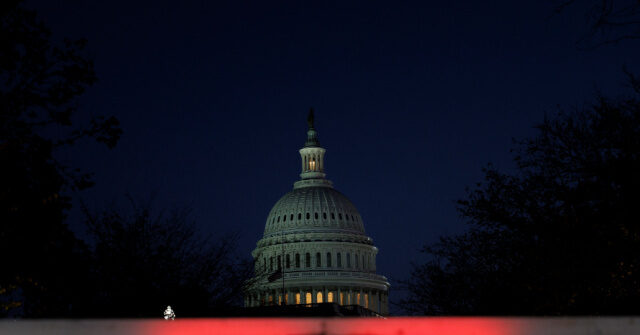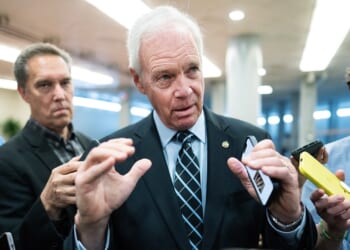The federal government will be back in business Thursday morning after the longest shutdown in American history.
The House passed a Senate-amended continuing resolution (CR) Wednesday night on the 45th day of a shutdown that began October 1. The vote was 222 to 209, with six Democrats joining Republicans amid two Republican defections. The bill extends most current funding levels through January 30, 2026, with three of the twelve appropriations bills attached, which will last through September of 2026.
Trump will sign the bill Wednesday evening, the White House announced before the vote. Federal employees will report to work Thursday morning as usual.
The House passed a seven-week CR to keep the government open at Biden Administration-era funding levels in late September, with only Democrat Rep. Jared Golden (ME) joining with Republicans to advance the measure. (Golden has since announced he will not seek reelection).
The lower chamber then adjourned while the Senate deliberated.
That deliberation quickly devolved into deadlock, as Senate Democrats – and Republican Sen. Rand Paul KY) – voted 15 times to block the House-passed CR from coming to the floor. Only Sens. Catherine Cortez-Masto (D-NM), John Fetterman (D-PA), and Angus King (I-ME) broke ranks with their Senate Democrat Caucus to vote on the procedural motion to enable the shutdown-ending bill to advance.
Five of their Democrat colleagues relented Sunday after 15 failed votes, enabling the bill to pass Monday evening 60 to 40.
After well over a month, Republican unity had shown no signs of cracking. And Senate Democrats were ready to cut a deal at almost any cost, although only eight of them – the bare minimum needed to advance the measure – voted to move forward.
None of those eight walking the plank to vote with Republicans face reelection in 2026, a sign of the political peril facing any Democrat willing to open up Donald Trump’s government.
In return for their assistance, Democrats received nothing that had not been offered weeks before.
The political cost for Democrats may prove high, far beyond simple blame for the shutdown pain, which included missed food stamp payments and paychecks as well as delayed and canceled flights.
The party’s most Left-leaning base, buoyed by tough talk from Democrats – most notably Senate Minority Leader Chuck Schumer (D-NY) – expected unlikely concessions from ruling Republicans, or at least the opportunity to inflict political damage on the party of Trump.
Instead, Republicans emerge more unified than thought possible just a week prior, after Democrat over performance in off-year elections seemed likely to propel Democrats towards electoral gains in the 2026 midterms.
Democrats had hoped to force a national conversation on the issue of healthcare, settling on the goal of pushing to extended covid-era enhanced Obamacare premium subsidies as their cost for reopening the government. The subsidies, originally sold as necessary to aid Americans during the pandemic, are set to expire at the end of the year.
Republicans, led by Majority Leader John Thune (R-SD), maintained they would not consider the separate issue until the government was reopened. Thune never relented, and the Senate Republican Conference stood behind him.
As part of the weekend agreement with Thune, Senate Democrats received a promised vote on a bill of their choice to extend the subsidies, although that promise includes no guarantee to pass the bill, which is almost certain to die on Capitol Hill. Thune has floated that option to reopen the government weeks prior to Democrats caving.
Now Democrats must deal with a civil war over who will lead the party, and in what direction.
Healthcare is likely to remain an issue on Capitol Hill in the weeks ahead of the expiration of enhanced Obamacare subsidies.
But instead of Democrats possessing the initiative, Republicans may hold the upper hand – should they choose to play it. Any extension or modification of the enhanced subsidies is likely to be as part of a broader Republican healthcare proposal.
Golden and Reps. Adam Gray (D-CA), Henry Cuellar (D-TX), Marie Gluesenkamp Perez (D-WA), Tom Suozzi (D-NY), and Don Davis (D-NC) voted with Republicans to pass the bill. Reps. Thomas Massie (R-KY) and Greg Steube (R-FL) voted against it.
House Minority Leader Hakeem Jeffries (D-NY) inability to keep moderates in his camp suggests trouble ahead for the embattled leader, whose leadership style has been widely criticized by Democrats as inadequate in the age of Trump.
But its Schumer, who has flailed since March when he promised to defeat a Republican-led CR of Biden-era spending levels only to fold hours later, who faces the strongest political headwinds.
His shutdown strategy has been condemned by moderates in his party who supported ending the shutdown after almost a month and a half. And the far Left of his party blames him for Senate Democrats caving to end the shutdown without any wins and a damaged Democrat brand.
Schumer’s head might be the more likely head to roll first as Democrats look for firmer, more effective leadership to resist the Trump administration and lead Democrats back into congressional majorities and then the White House.
But with the January 30 deadline quickly approaching, Democrats unquestionably will need a new strategy regarding government funding. What that strategy will be – as well as who will direct it – remain up in the air.
Bradley Jaye is Deputy Political Editor for Breitbart News. Follow him on X/Twitter and Instagram @BradleyAJaye.


















